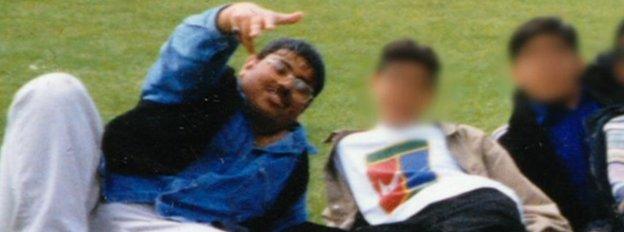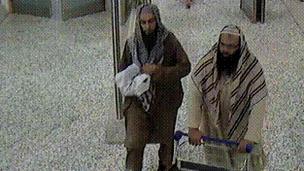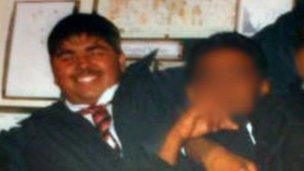The joker who wanted to be a bomber
- Published
- comments

Always the joker: Irfan Naseer at school
Three men have been found guilty of preparing acts of terrorism including what could have been a massive bombing campaign against targets in the UK.
Irfan Naseer, Irfan Khalid and Ashik Ali, all from Birmingham, face life sentences for their plan to become suicide bombers. This is the story of how a school joker became one of the most dangerous men in Britain.
Irfan Naseer wanted to be the next big thing.
For most of his adult life, he had struggled to find his place in the world, but by 2010, he had stopped struggling.
He didn't seem to care that his mates called him Big Irfan, Chubbs or Chubby.
Because in his own world, he had become a different kind of big man.
He was going to be a bomber.
And he was going to show the world a thing or two, even if pressing the trigger on a homemade detonator would be the last thing he would ever do.
He and Irfan Khalid, described in court as his right-hand man, left their Birmingham homes twice to join training camps linked to al-Qaeda deep within the tribal areas bordering Afghanistan - the second trip ending in the summer of 2011.

Training trips: Khalid and Naseer at Birmingham Airport
Their plan was simple. The men joined the camps to receive broad training in bomb-making, weapons and poisons from al-Qaeda contacts.
Armed with this knowledge, they would then bring it back to the UK and spread it to other recruits. It was up to the men themselves to decide what to do with the skills, rather than wait for commands from the other side of the world.
On their return, they began seeking recruits for a bombing campaign. They already had Ashik Ali in the team. Naseer organised a Pakistan training camp trip for four other men from Birmingham - and identified others he wanted to be part of his plan.
None of the men realised they were already being monitored by MI5 and the police. In fact, they were being watched so closely that investigators knew that the four recruits had been sent overseas.
And so during the summer of 2011, the security services sat quietly listening and assessing Naseer's plans. Over the course of three months at Woolwich Crown Court, the jury were told that "Big Irfan" and the others were full of big talk - and bigger plans.
Raising cash
In one bugged conversation, the men criticised the 2005 London bombers, saying they had forgotten to add nails to their devices to make them more lethal.
Naseer talked about martyrdom and the merits of various forms of attack, from using rifles on the streets to time bombs. Khalid joked about them being "suicide bombers driving around ready to take on England".
Another conversation revolved around whether they could fit blades to a car and cut people down in the street.
None of this yet amounted to a specific attack plan and so investigators sat tight and continued to listen.
What was clear was that Naseer and the others were considering plans and timetables. They had begun raising cash and were looking for somewhere safe to operate away from prying eyes.
Naseer talked about opening an Islamic shop to provide a cover story for recruitment and plotting in its back rooms. Khalid agreed, saying in one monitored conversation that it would provide "beautiful cover". But in the end, they settled on a small flat provided by Ashik Ali.

Charity collecting: Naseer, Khalid and money man Rahin Ahmed under surveillance
As for the cash, Naseer and his recruits went onto the streets of Birmingham during the Islamic holy month of Ramadan, rattling collection buckets and wearing high-visibility tabards.
They sought donations for a local madrassah project and a legitimate international development British charity, Muslim Aid.
But the real plan was to con ordinary people. They collected some £13,000 from Muslims who regard it as a religious and moral duty to give to charity during Ramadan.
Rahin Ahmed, another member of the cell, said he could make more money by investing it in online currency trading - he lost £9,000. Ahmed has separately pleaded guilty to fund-raising for terrorism.
Undeterred with the disastrous bungling of his associate, Naseer maintained his resolve. He warned the others to be on their guard for Satan, who could enter their dreams and make them doubt the righteousness of their path.
He said that if they allowed doubts to enter their mind, then "you're not gonna do it, bro, you're not going to press the button".
'The real deal'
Investigators were increasingly concerned by this kind of talk and their suspicions were reinforced when Naseer and Khalid revealed they had recorded martyrdom videos while being trained in Pakistan.
"We realised they were the real deal, committed and passionate in what they were doing," said Det Insp Adam Gough, who led the West Midlands Police inquiry.
"It was very chilling to listen to some of it in terms of 9/11 and 7/7. They revered those sorts of things and wanted to create another incident that people would remember and celebrate in the years to come."
frombinatwhitestreetcopy.jpg)
Burnt note: Bomb instructions found at the safe house
Inside Ashik Ali's safe house in September 2011, Naseer began explaining to Ali how to make homemade bombs.
His knowledge, the jury heard, came from a combination of the training camps he had attended and his university degree in pharmacy.
The jury at the trial were taken through long recordings in which Naseer went to great lengths to explain the finer technical details of explosives.
Ashik Ali doubted whether the men could carry 20kg rucksacks and Naseer said that it would be easier to carry bombs of half that size. He suggested that if they used timers, they could build more devices.
"Seven or eight of them in different places," said Naseer. "With timers on… probably to go boom, boom, boom everywhere."
Investigators had already heard the men talking about being dead by the middle of 2012. Now that the conversations had turned to how to construct devices and how to use them, they moved in to stop the plot progressing.
Time had run out for Irfan Naseer. He, Khalid and Ali were arrested along with nine others. Six men have already pleaded guilty to terrorism offences.
The men had never got to the point of fixing on a target. But in his police interview, Ashik Ali told detectives that Naseer had proposed making suicide bomb vests, acquiring guns and targeting British soldiers.
During the trial, Irfan Naseer denied that he was a terrorist, but he wove a tale of internal Pakistani-community politics in Birmingham with him as the victim of malicious rumours. His barrister told the jury that Naseer was a fantasist who would have made a "rubbish terrorist".
Joker to threat
Anas Zein Al-Abdeen was at school with Irfan Naseer. He told the BBC's Inside Out West Midlands programme that his former friend became increasingly extreme as he entered adulthood, holding views a world away from the man he had known as "Chubby", the school joker.

Popular at school: Irfan Naseer
"I'm sad that this guy could have been serving the community by being a pharmacist, by maybe doing charity work that will really make a difference, instead he's harmed the community," Mr Al-Abdeen said.
"The guys [at school] stuck around with him because he was funny, lively, always had a lot to say, quite outspoken.
"[But] he couldn't adapt to working life. This, I think, is the start of his downfall. He started looking at achieving something else apart from his career or his profession."
Naseer was angry about international politics, expressing frustrations about injustices in the Muslim world.
Mr Al-Abdeen and others in Birmingham have told the BBC that the local Muslim community was increasingly worried about what he was up to. During the trial, the jury heard that one influential local man had confronted Naseer, as rumours spread that he had sent four recruits to a training camp.
He added: "The way he used to dress up, a lot of people found him intimidating. I know for a fact when he used to go to the mosques that a lot of people used to look at him with disdain.
"He does have extreme views. I mean there's no doubt about this. You'd be excused if you thought the film Four Lions was based on this guy Chubby because his friends never really took what he said seriously."
"I believe him when he said he wanted to be the big man," he told the BBC. "He just couldn't comprehend everybody moving on and he was struggling to move on from school days. He wanted to prove something."
Inside Out West Midlands will be investigating the men at the heart of the terror trial on Monday 25 February on BBC1 at 19.30 GMT. If you don't live in the BBC West Midlands transmission area it will be available here on the BBC iPlayer.